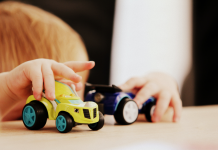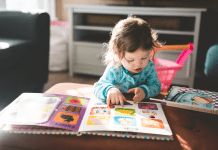It was a rough morning around our house. We woke up too early after staying up too late at a birthday party. We cried over spilled milk. We had a potty training mishap.
Well, those were my daughter’s problems at least. On my side, my bruised rib is still hurting from the World’s Longest Cold; I’m seven months pregnant, which is just the umbrella covering a host of aches, pains, and complaints; and I’m exhausted.
So, to make a long story short, we both cried. My husband/her daddy was responsible for putting us both back together after our respective morning meltdowns, which he did for her by explaining that everyone has accidents sometimes (something I can totally relate to with my second pregnancy bladder control issues!), and which he did for me by massaging my aching side and reassuring me that yes, I can make it 12 more weeks.
I was thinking about this and about the headache and hassles of the morning, and I was feeling pretty sorry for myself and starting to get emotional again while walking out of the house to go to work, because of course, work is always still there, even in the midst of grownup and toddler existential crises. And, what I realized is, no matter how bad I feel and how big my problems are, her problems are just as big, if not bigger, in her eyes and in her overall life.
I’m an adult, and my job is to be a good parent, a good wife, a good employee, a good friend, and a striving-toward-self-actualization human being. It’s not easy, but I know if I mess up in one area, I have 30-something years of life experience to tell me it’s not the end of the world. I have years of other days—good and bad—to compare to and to realize that just because this morning sucked, that doesn’t mean every morning will. Just because I messed up something in one area of my life, doesn’t mean I’m failing or destroying every part of my life, even though it can feel that way sometimes.
For children, their job is just to be children. Maria Montessori famously said that “play is the work of children,” but everything they do is part of their work, part of learning how to engage and interact with their world. When I spill a cup of milk, I get annoyed with myself for not paying attention or ticked off at the milk gallon, the cup, my husband, or the world. When she spills a cup of milk, that cup of spilled milk is the biggest thing in her world at that moment and she questions her motor skills, whether she’s a big girl, and whether she can hold it together. When she doesn’t make it to the potty in time, she feels like she’s a failure at the one thing in life that is simultaneously her greatest aspiration and her biggest fear. When something goes wrong, her whole world is wrong at that time, because the circle of things she can control is so small. Someone else tells her when she can eat, when she can go outside, when she can play, when she has to clean up, take a bath, go to sleep. When something distresses her, most of the time she has to turn to another person to try to make the situation better.
I try to think of all these things when I interact with my daughter. Often, she’s not doing something to try to be difficult or naughty; she’s just trying to understand her place in the big world around her. There are days when—I admit it—I’m not at my best, because I’m tired. She has the same kind of days. She has a friend come over to play who wants to sit in her high chair or play with her favorite doll. In her mind, her baby sister is going to be just like that friend, and she worries about it and wants to make sure baby sister is going to have her own toys. When she doesn’t want to go to school, it’s not because she wants to make us stressed out about dropping her off. It’s because we, her parents, her very best friends in the whole wide world, are taking her away from her home, her very favorite place in the whole wide world, and leaving her in an environment with so many more variables of toys and teachers and weather and friends.
So, how do I handle it? I try to keep things in perspective. Her problems are just as big as mine. Every little life lesson gives her another piece to the puzzle of who she is and how secure she is in this life and in her own skin. My job as her mother is to make her understand that these little things—that are really big things to her—don’t define her. She’s not a bad girl when she has a meltdown; she’s a little person who is having a hard time, who feels the weight of the world on her tiny shoulders the same way I do when I want to just throw myself across my bed and cry into my pillow. She needs something from someone who loves her to make it better. It might be a hug. It might be helping her to verbalize her emotions. It might be just a few minutes of quiet time, an offer to read a story, or a retelling of a similar mistake I made when I was a little girl. My goal as a parent isn’t to raise a perfect child; it’s to help my daughters grow into girls and then into women who are secure in themselves, who trust themselves, and who draw from their own internal strength. I can do that by helping them through their issues and being understanding when something comes up. After all, they’ll be watching the way I handle their problems—big or small—and turn to my example as a guide for how they should handle them going forward.












